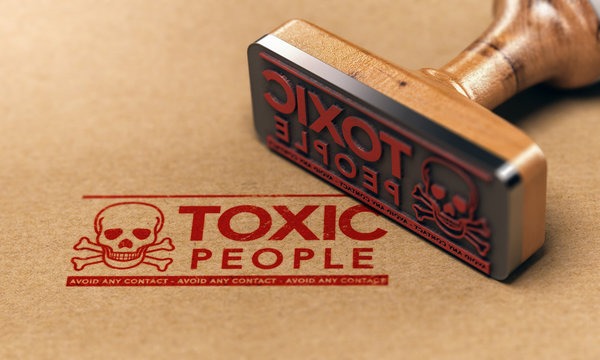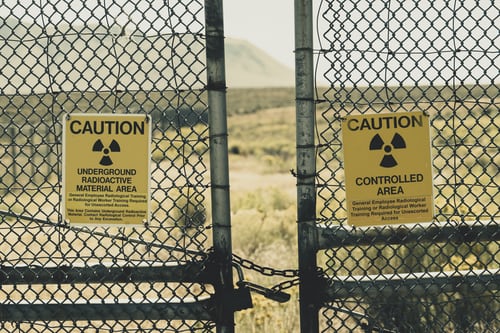Are you in a toxic relationship? When we are in an unhealthy relationship the red flags may not always be so apparent. These are 25 warning signs of a toxic relationship and tips for fixing it.
Yea, every relationship has ups and downs, but generally you can see the light at the end of the tunnel. Working together and finding common ground is something all healthy relationships need.
Toxic relationships on the other hand are different beast. They can be hidden for long periods of time and then rear its ugly head and wreak havoc on our lives.
There are plenty of subtle ways on knowing your relationship may be toxic.

25 signs of a toxic relationship
These signs vary from not-so-obvious to in your-face-evident
1. Lack of Support
Support adds quality and motivation to our lives. Having a supportive friend or partner is someone who provides emotional stability why still allowing us to act on our own.
In an unsupportive relationship it can feel like the one we love and are closest to really doesn’t understand us at all.
How to fix this: People aren’t mind readers. Sometimes they may not even aware that they aren’t being supportive. Open up about how you feel instead of shutting down and brushing it under the rug. Share your ‘why’ because they simply may not understand.
If you share your thoughts, feelings and ideas with them and they still aren’t supportive. It may be true that they really don’t understand you or refuse to.
2. Jealousy
It’s normal to experience forms of jealousy and envy from time to time. However, when it runs rampant in a relationship and turns into accusations, paranoia or obsession it is 100% toxic.
In addition to experiencing jealousy, if in your relationship the other person tries to make you jealous that is also toxic.
How to fix it: If you’re the jealous party, don’t act on your feelings. After practice, you’ll gain more and more control which eventually may even lead to vanquishing that jealous monster.
Moreover, express your jealousy in a calm and soft way. Never accuse and never attack, simply share your feelings. It is not only important to trust your partner but trust yourself!
3. Controlling Behaviours
If you are in a relationship where your partner or friend questions you all the time or becomes overwhelmingly upset, those are signs of controlling behaviour.
Being controlled or controlling someone else can take a toll on someone’s self-esteem, weaken trust and ruin healthy communication.
How to fix it: View your partner with compassion, practice healthy communication and find support outside the relationship. Being controlled can cause anxiety and learning how to manage that is important.
Additionally, if you are controlling, you may need to learn how to express yourself without ‘controlling-vocabulary’. Remember, you can only control yourself and your reactions.
4. Resentment
Resentment and anger is something that festers and boils up inside us. It can explode or leak our subtly. Either way, this is a toxic trait that not only hurts the relationship but also hurts yourself.
Holding onto grudges and little stresses can build in relationships. This is a sure-fire way to ruin a friendship, marriage or any other relationship
How to fix it: Think about what is causing the resentment. In order to move on you need to fully forgive the other person and also forgive yourself. Talk this through with your partner.
Using specific language that isn’t accusatory is a good way to start. Accept their flaws as well as your own and also consider all the positives they bring into your life.
5. Lying & Dishonesty
Are you constantly making up lies about where you are or who your are with? Maybe, you should ask yourself why you are in that relationship.
Moreover, if lying and cheating is a common occurrence in your relationship, you likely have very little trust. Once trust is gone, it’s very hard to get back. Lack of trust can turn confident people insecure, jealousy and suspicious.
How to fix it: consider the reason you’re lying or the reason you’re being lied to. additionally, communicate! You’d be surprised how far honesty can take you. Lastly, practice forgiveness. It can be tough but it’s the step you’ll need to take to get that trust back.

6. Lost Relationships
You’ve stopped seeing friends and family and honestly thats pretty normal. However, if it is to avoid conflict with your partner or avoid explaining to your friends what’s happening in your relationship, that’s no good.
How to fix it: Make an effort to see friends and family. Talking about your feelings to people you know who will be there for you is important and will give you new perspective.
7. Waiting For Change
Are you staying in a relationship because you are hoping to see the other person’s potential? Well, more often than not, that change wont come.
You might be scared that if you leave they’ll change, and that might be the case. However, you need to ask yourself if it’s worth it.
How to fix it: Of course communicating your issues in a relationship is important. But, you need to put your needs first in order to be happy. Don’t wait for change because it may not ever come.
8. All Talk, No Action
We’ve all been there, when we talk big and maybe under deliver. However, this shouldn’t be a common pattern especially in a relationship. It’s one thing to make plans and they fall through once or twice, but if it happened every time that’s not ok.
How to fix it: Start by doing things separately. Maybe you going out and sticking to your plans will be motivation for your relationship to change. If not, you’ll probably come to realization that this isn’t the relationship for you.
9. You Avoid Expressing Your Wants, Needs & Feelings
We all have important needs and wants in a relationship. Not being able to express them is a huge hinderance in a friendship or partnership. When our needs and feelings are ignored or even mocked, that is a tell-tale sign of a toxic relationship
How to fix it: Start off with calm communication. Don’t accuse or use language like “you are or you aren’t” use “I am” statements. If there isn’t any changes and you still feel like your needs are a burden, get out of there.
10. Constant Compromising
Relationships are a two way street, and compromising is healthy and normal. However, if you’re the only one doing the compromising that’s an issue. It takes two to tango and no one person can hold a relationship together.
Quit telling yourself that if you try a little harder, or say the right things, the relationship will be better. That’s a fantasy and a sure-fire sign of a relationship heading for doom.
How to fix it: say it once, say it again, communicate. Look for sources outside the relationship to get some perspective. It might just come down to the fact that you two are not meant to be.
11. Can’t Say ‘NO’
Taking ‘no’ for an answer is important for any relationship. Don’t get rid of that word even for love. Compromise is important but respect needs to be reciprocated from both sides.
How to fix it: Find you ‘no’ and stick with it, a good partner will respect that and move on.

12. Passive-Aggression
Being indirect or dancing around an issue is toxic and honestly, cowardly. It can be very subtle, like anger disguised as indifference ‘I’m fine’ or ‘whatever’. It can be manipulation disguised as permission ‘I’ll just sit at home alone while you go out and have fun’. Or the villain playing the hero, ‘you look really tired, why don’t you stay home and I’ll go visit so-and-so myself’.
How to fix it: If it doesn’t sit right with you, then it’s probably something that needs to be discussed.
13. No Privacy
You deserve to be trusted unless you’re lying or cheating. If you’re in a relationship where the other person is going through your phone or reading your journal, that is toxic 101.
How to fix it: Discussing it could help, but ultimately you can only control yourself. If that behaviour doesn’t stop, it’s a safe bet you should call it quits.
14. Relationship Scorecard
We all make mistakes, but if your partner doesn’t let go of the past and constantly brings it up, thats poor relationship etiquette. It is a sure way to kill a relationship by constantly bringing up the past.
How to fix it: This is a control tactic and a sign of insecurity. Seeking outside assistance may be required. Only the person perpetrating this behaviour can change it.
15. The Blame Game
Blaming your partner for your emotions is selfish. If you’re having a bad day and your partner isn’t being super supportive, it is important to think before you act.
If you never asked for the emotional support, they may have no idea you need it.
How to fix it: take responsibility for yourself and expect your partner to be responsible for theirs.
16. Buying The Solutions To The Problem
If a problem comes up and instead of talking it out and expressing feelings, someone buys the other person a gift or a trip. It is an easy way to brush the problem under the rug. Additionally, it sets an unhealthy precedent within the relationship.
This could give one partner the incentive to act out instead of taking accountability for the problems within the relationship.
How to fix it: Deal with the problem head on. Communicate, communicate, communicate!
17. Walking on Eggshells
Worried about bringing up your problems because it could provoke a not-so favorable response? Avoiding conflict and keeping issues to yourself is a sign of toxicity in a relationship.
Being able to express yourself is important. If your friend or partner blows up at any sign of conflict that isn’t healthy.
How to fix it: Consider your tone before you interact with that person. Tell your partner how you feel without nagging, accusing or beating down their self esteem. Focus on the issue at hand instead of what your partner may or may not be doing.
18. Letting Yourself Go
In some toxic relationships a sign can be is subtle as you stop taking care of yourself. This could be in the form of skipping hygiene practices, keeping a cluttered environment or living the same clothes for days on end.
If you are withdrawing from hobbies you once loved, neglect your health or sacrifice your free time, you might be in a toxic relationship.
How to fix it: Take time for yourself. This not only will make you feel better but can ease symptoms of depression and anxiety.
19. Constant Stress
All relationships experience normal amounts of tension. However, if you find yourself constantly on edge that’s a good indicator that something is off.
Stress affects not only our mental health but physical health as well. It is important to get to the bottom of it before it becomes too much.
How to fix it: first things first, what about the relationship is stressing you out? It is not only important to talk about how you feel but also listen to how they might feel as well. Create a list of stress-reducing activities you could do together!
20. Disrespect
This is a no-go in any relationship. If your friend or partner is making jokes about you, teasing you, or blatantly showing you disrespect, that is not only toxic, it is abusive.
How to fix it: Start by communicating your feelings but if things don’t change, get out of there. It’s not worth it.
21. Negative Communication
Negative communication looks like passive-aggression, cynical comments, negative attitude, selfishness, accusations, jealousy, the whole shebang!
It can be one or two of those traits or all of them. Either way negativity only breeds more negativity. It can be a very difficult thing to combat.
How to fix it: Start by processing your feelings first and when you talk to them, use ‘I’ statements. Set boundaries and put the focus on being heard and listened to!
22. Poor Financial Behaviours
This might not seem like a big deal in the beginning but as relationships progress, poor financial habits can be dangerous. Impulsive or expensive buys are not a good sign for a healthy relationship.
As you get further along in your relationship, spending large sums of money without consulting you is risky, negligent and irresponsible.
How to fix it: Always have your own money that they don’t have access to. It’s important to always have some form of independence even in a relationship. Talk to your partner about their spending habits in a gentle way. See if you can come to a solution together.
23. Isolation
If your partner or even friend bad-talks or tries to distance you from your friends, that is a sign of toxicity. A good relationship will not only encourage you to spend time with family and friends they will get along with them as well.
How to fix it: Set boundaries and stick to them, then communicate your needs and feelings! If that doesn’t work, get out of Dodge.
24. Co-Dependence
dependence has many signs, it can look like difficult making decisions in a relationship, to low-self esteem to always needing to be in a relationship.
Unhealthy clinginess is when someone doesn’t get enough fulfillment from themselves and relies heavily on others. Not only can this lead to person issues like addiction and self-destruction, it can also affect a relationship.
It can end up exhausting, neglecting and creating long-term problems in any relationship.
How to fix it: “If you can’t love yourself, how can you love someone else?” It’s cliche, but true. You have to be able to spend time alone in order to be a great partner.

Conclusion
Overall, the key take aways from this is that communication is everything! Relationships that are toxic take a huge toll on both mental and physical health.
Unhealthy relationships have many indicators and don’t only affect romantic partners but also friendships and families. It is important to understand your needs.
Trusting yourself, putting yourself first (not at the expense of other peoples feelings) and setting boundaries is crucial for any relationship.
Up Next… Why Your Spouse Spends More Time With Their Friends

[…] 24 Signs Of A Toxic Relationship […]
[…] 24 Warning Signs of a Toxic Relationship […]